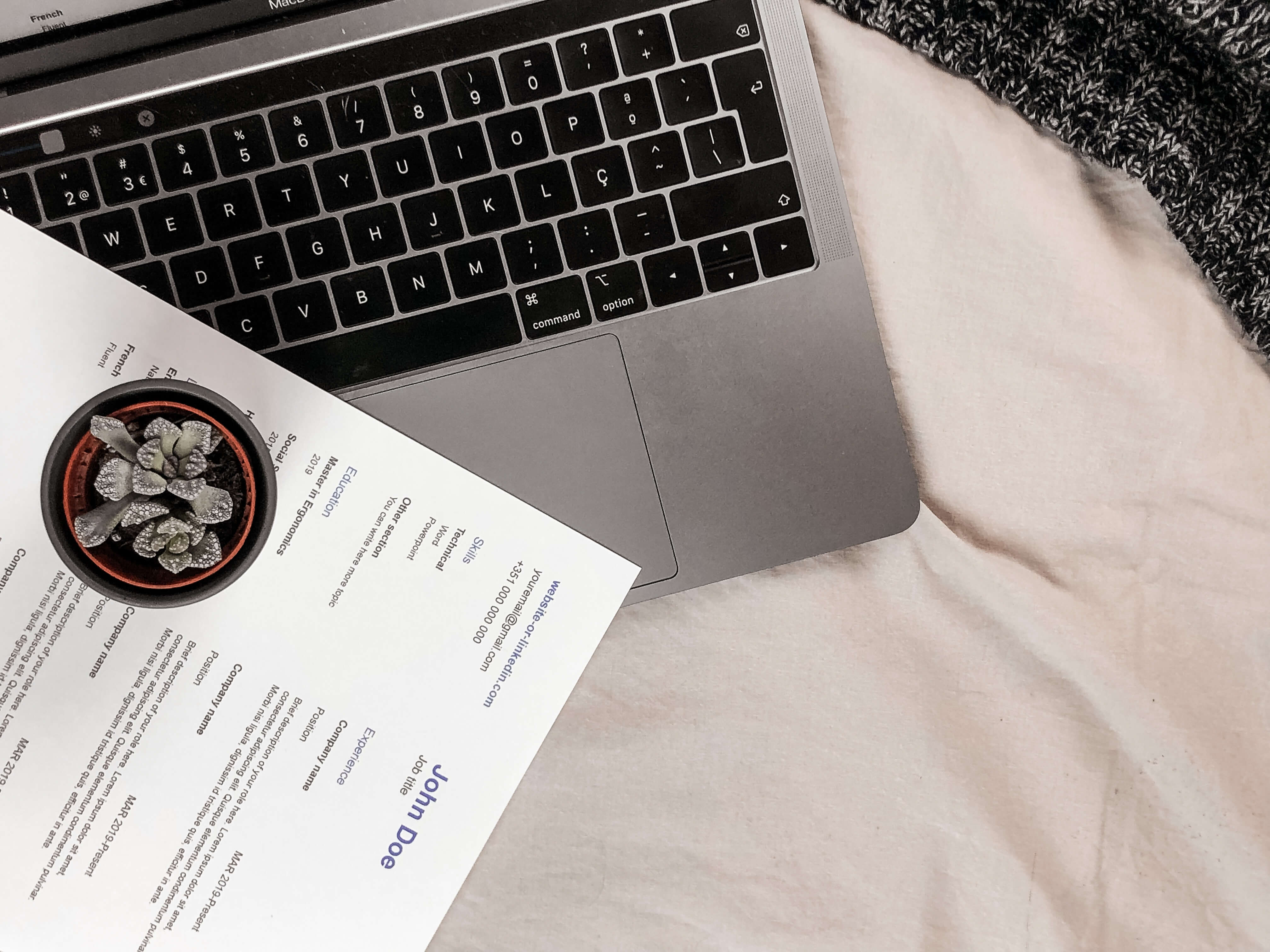
How to boost your engineering CV
15 Feb, 202310:28Whether you're looking for your first engineering job or to make a move in your career, cre...

Whether you're looking for your first engineering job or
to make a move in your career, creating a persuasive curriculum vitae or resume
is a crucial step in the process. A well-written CV showcasing all your most
impressive abilities can increase your chances of a recruiter realising that
you have the skills and dependability they seek.
There's high demand for engineers globally, but there's also
high competition, so ensuring your CV meets what the recruiter is looking for
will significantly increase your chances of securing an interview.
So what makes a job-winning engineering CV?
What to include in your CV
- Personal Details - At the very top of your CV, you should include basic personal details. Include your name, contact details, Name, Address, Telephone number and Email address. A link to your LinkedIn profile can also be helpful if your profile positively showcases your experiences, training, and connections in the industry.
- Your professional summary – Next, include a short paragraph explaining why you fit the role, your best or most recent experiences, one or two career highlights, and relevant skills. This gives the recruiter the motivation to read further.
- Your technical skills/experience – It's essential to list technical skills and knowledge relevant to the role. Ensure to match as many required skills in the job description as possible.
TOP TIP: Where you have yet to gain the exact skills or
experience, try to identify similar or transferrable skills that would be
useful to the role.
- Work history and Relevant experience in a previous role – This is where you can show that you've worked in similar positions. Start from the most recent and work backwards. Try to focus on achievements over responsibilities in this section.
Include examples from all relevant work
experience, either full-time or part-time. If you're new to the industry, did
you participate in internships, volunteering or research projects?
- Relevant education, training and awards – This
section includes relevant qualifications through further education or
additional study. Industry certifications that are relevant to the role also
qualify. If you're new to the industry or are lacking in this section, consider
your educational qualifications in relevant science, maths, and languages.
Tailoring your CV to the job you're applying for
A big mistake is to create a single CV and use that over and
over again to apply for different engineering roles. A generic CV will likely
miss essential details, keywords, or other information to pass the Applicant
Tracking Software (ATS)
stage.
While keeping a document of your skills and experience is a
good idea, it’s important to tailor this template to the job. Analyse the job
description and essential/desirable skills, and ensure your professional
summary, skills and experience, and education include these points with the
exact keywords.
Paying attention to the visual design and formatting of your CV
A common trait of engineers in any industry is good
organisation skills, attention to detail, and structural accuracy. If your CV
is poorly formatted and hard to read, this already shows a lack of this crucial
skill.
Your CV will almost certainly go through applicant tracking
software first, where software will scan your CV for the right keywords for the
role and score your CV before a human sees it. To maximise your chances of
passing this check:
1.
Ensure your CV is formatted simply – unless you
are applying for a job that requires visuals, don’t include graphics or images.
2.
Use consistent fonts and apply headers where
possible
3.
Ensure you are submitting your CV in the format
requested by the recruiter
Highlight memorable projects/ demonstrate experience and achievements on
projects
Once your CV has passed an ATS check for keywords, it will
then be read by a recruiter. Recruiters could read hundreds of CVs a day, and
when all candidates have similar qualifications and experience, you need to
find ways to stand out.
Consider previous projects you've worked on and how your
contribution met or exceeded targets. Think of what you achieved and how,
rather than simply listing tasks you performed.
For example, a personal statement that includes "implemented
a $2m power engineering contract with Engineering Company X within the target
of 8 weeks" will grab the reader's attention more effectively than "worked
as a project manager".
Some ideas include:
- Did your work result in a cost-saving or any other achievement?
- Did you implement something new or innovative, such as a process or product?
- Did your work achieve impressive results, such as revenue or turnaround time?
- Did you use additional training to achieve something you couldn't have otherwise done?
Showcase your soft skills – what are employers looking for?
Hard skills are learned through training or work – practical
things you can do. Soft skills are broad and are more about who you are and are
equally important to highlight on a CV.
Employers often look for:
1. Up-to-date technical knowledge – Technology in engineering is evolving rapidly, and learned skills can become outdated in just a few years. The best-performing engineers stay on top of industry advancements and updates. Keeping up with the latest technology and safety knowledge is critical.
Look for short courses to keep your knowledge fresh and stay on top of developments through social media, blogs, and industry news. Get involved with networking and industry groups where you can learn from others and share ideas. Use this knowledge to apply and offer continual improvement to your role.
TOP TIP: Your CV should include examples of implementing up-to-date technology, processes and techniques gained from training or experience.
2. Communication skills – Communication with colleagues, employers, or clients is vital to any industry. With the added technical and safety issues that engineering roles typically require, conveying information understood depending on who you're communicating with is critical.
For your CV, demonstrating this skill starts with showing your ability to meet a role's requirements concisely. Consider each requirement as 'Can you do this?' and answer with an example, 'My experience in doing this led to this outcome.'
TOP TIP: Your whole CV should be written
and formatted to demonstrate this soft skill.
3. Creative thinking and problem-solving – Creative
and critical thinking are core skills for the engineering industry. Technical
projects often require developing new ideas to solve issues as they arise by
adapting your workflow or suggesting new methods to fix a problem.
Problem-solving skills can be developed over time as your experience grows. Once you're comfortable with your skills without instruction, you can explore how to apply that knowledge in new ways.
Employers value those who can identify problems and come up with multiple ways to solve them quickly and on budget.
TOP TIP: Your CV should include examples
of tasks where you have shown the ability to solve problems creatively.
4. Organisation skills – Some organisational skills, such as project planning or managing systems, can be considered technical. But engineering companies are also looking for 'soft' organisational skills, which indicate if a person can complete their job with minimal support.
These skills include setting realistic goals, planning and prioritising tasks, and ensuring you can identify your limits in workload. Time management, including punctuality, reassures employers that you are predictable.
TOP TIP: Make sure your CV highlights your ability to be organised and self-driven.
5. Teamwork – Being able to work in a team is a combination of communication, technical and organisational skills. Engineers will often work alone within their roles but will coordinate with colleagues on larger projects. And employers are looking for people who are as committed to achieving team goals and the business as their personal goals.
Being able to compromise, share ideas, and support other people with your skillset is considered mandatory for an engineer.
TOP TIP: Your CV should reflect that you are experienced and considerate of working with others for a collective aim.
6. Adaptability – Adapting to new processes and technology is highly desirable to an employer. It's important that engineers actively keep their skills and knowledge up to date, particularly in emerging industries where technology can change year-on-year.
It's equally important to accept when an ageing process or technique is no longer working. Being stuck in old, inefficient ways of working slows down a team and a project.
TOP TIP: Aim to show in your CV that you
are adaptable and look for opportunities to innovate.
7. Leadership – While leadership might be considered a skill only applicable to management roles, taking responsibility and supporting others is an essential soft skill for an engineer. Demonstrating leadership might be spearheading a new idea, taking responsibility for an in-work society or initiative, or organising work or systems on behalf of a colleague and providing training.
Leadership is a strong indicator of an individual who can support others when needed. It is a critical skill for individuals looking to advance their careers, move up into management, and demonstrate a broader understanding of company strategy.
TOP TIP: Try to include examples of
leadership skills or experience in your CV, even if your role does not involve
supervising others.
Proofreading
Once your CV is ready, the next step is proofreading.
Ideally, it would help if you asked a friend to do this for you, or even
better, use a CV-checking service. Tools such as Grammarly are helpful at this stage as
they can spot spelling or grammatical errors, tone, and readability.
When proofreading, consider the following;
- Is the document easy to read, with sections in the correct order?
- Are there spelling or grammatical mistakes?
- Does the CV meet each point of the requirements of the role or as many as possible with alternatives
- Does the CV highlight the candidate's strengths and achievements?
- Are claims of achievements backed up with statistics?
- Is the writing concise and complete?
TOP TIP: Always remember that engineering roles are about organisation and accuracy, but a CV must also engage a recruiter.
Information you should not include on an engineering CV
There is also information that shouldn't be included in a
CV. Personal data, including age, ethnicity, religious information, hobbies,
marital status, sexual orientation or health, should not be included. Additionally,
you should not be required to provide a photograph at the CV stage.
Engineer CV Template
Use this template to help you write a CV.
[Full name]
[Phone number]
[Email address]
[Online professional profile link]
Professional summary
[This section should provide three to five sentences demonstrating why you
are well-suited for the role. Include any applicable job experience, noteworthy abilities, and other capabilities that make you an ideal
candidate. Make sure to discuss how you plan to apply these qualities to the
job.]
Skills
[Soft or hard skill 1]
[Soft or hard skill 2]
[Soft or hard skill 3]
[Soft or hard skill 4]
[Soft or hard skill 5]
[Soft or hard skill 6]
[Soft or hard skill 7]
Professional experience
[Job title]
[Company name]
[City and state]
[Month and year since you worked in this position]
[Duties, achievements and responsibilities completed in this
position 1]
[Duties, achievements and responsibilities completed in this
position 2]
[Duties, achievements and responsibilities completed in this
position 3]
Education
[Title of college or institution you attended,] [City]
[Name of the degree you achieved,] [Date you attended or completed the
degree. Start date to 'present' if you're still attending.]
[Name of minor if applicable]
Certifications
[Certification 1, date obtained]
[Certification 2, date obtained]
[Certification 3, date obtained]
Awards and accomplishments
[Name of reward, date you earned the reward]
[Description of the accomplishment or award you received]
Support from NES Fircroft
NES covers recruitment across many sectors meaning we have
supported clients and candidates across several industries for the last 50 years
in good and challenging times. If you're looking for your next role, browse our job vacancies today.
If you're looking for more career advice, check out our podcast.








